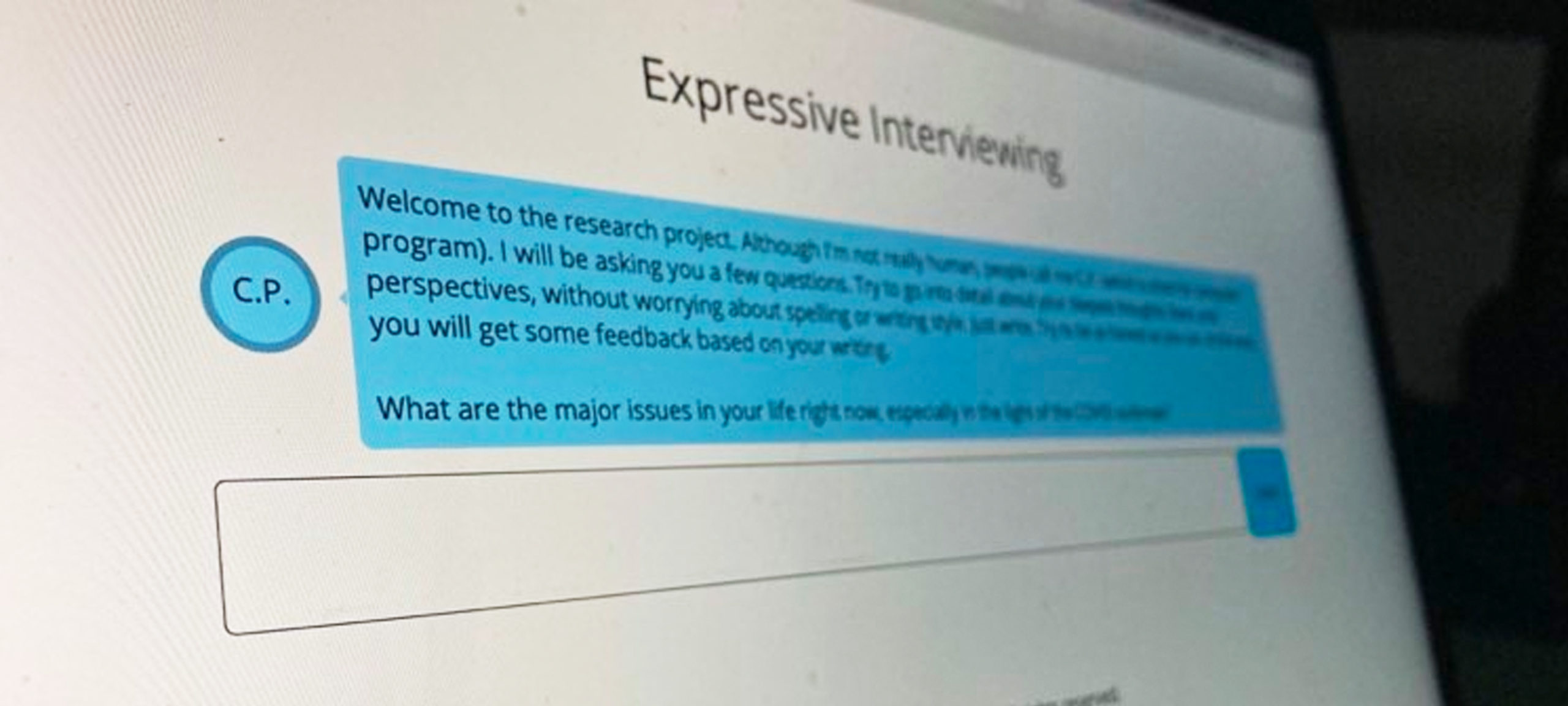AI-powered interviewer provides guided reflection exercises during COVID-19 pandemic
The virtual interviewer uses therapeutic writing techniques to help users cope with difficult situations.
A virtual interviewer powered by natural language processing offers socially-distanced support for people facing trying times. The dialogue system, designed by a collaborative team from the University of Michigan and the University of Texas at Austin, takes inspiration from counseling strategies like motivational interviewing and expressive writing to guide users through written self-reflection.
“It’s like a journaling exercise that has feedback and questions provided to the user to get them to think and write more,” explains Charlie Welch, U-M PhD student and co-author on the project.
Equipped with a set of base questions that outline the experience, the virtual interviewer develops followup questions in real time based on its understanding of what the user replies. It builds the questions from topics of interest they mention or emotions expressed in their language. The tool emphasizes insightful writing and deeper thought, encouraging the user to spend at least two minutes responding to each prompt.
“Unlike other systems that serve similar purposes, which frequently use multiple choice questions to progress in the dialogue, our aim is to have a natural dialogue where users can respond using free text,” says Rada Mihalcea, Janice M. Jenkins Collegiate Professor of Computer Science and Engineering at U-M and co-lead on the project. “The goal of our system is to encourage individuals to talk about any difficulties they may have encountered due to the pandemic.”

 Enlarge
Enlarge
Expressive writing, writing for the purpose of putting thoughts and feelings into words, is often used as a way to work through uncertainty or ambivalence. Similarly, motivational interviewing is a directed form of therapy that seeks to help the interviewees find clarity on an issue through guided questions. These provided the team’s starting point, as well as previous work done in Mihalcea’s lab on detecting emotions in written text.
“Both strategies rely on the fundamental idea that by putting emotional upheavals into words,” the team explains on the system’s website, “people can start to understand them better and therefore give them increasing feelings of control and provide a sense of coherence.”
The team released the interviewer as a response to the isolating effects that can result from social distancing measures designed to curb the spread of COVID-19, but they intend to carry the work forward as a method for dealing with a variety of difficult subjects.
“It is a framework that we can use to further build upon both in terms of leading conversations on other topics (such as racial injustice or life with chronic illness), as well as in terms of applying more advanced AI methods,” Mihalcea says. “Previous work in Expressive Writing and Motivational Interviewing – which we build upon – has found in numerous studies the usefulness of talking about one’s challenges.”
While the authors aren’t advocating its use as a stand-in for therapy or other treatments, they see it as a useful tool to handle emotions and stress while feeling isolated or overwhelmed.
“We see this as a tool that anyone could use to reduce stress,” says Welch. “This exercise could help reduce anxiety and help people solidify thoughts that could then be explored later with a professional.”
The project is co-led by Mihalcea and James Pennebaker, Regents Centennial Professor of Psychology at the University of Texas at Austin. The team includes Professors Kenneth Resnicow and Larry An, Research Scientist Veronica Perez-Rosas, PhD students Charlie Welch, Allison Lahnala, Sarah Seraj, and Siqi Shen. More information is available on the system’s website.
 MENU
MENU 
